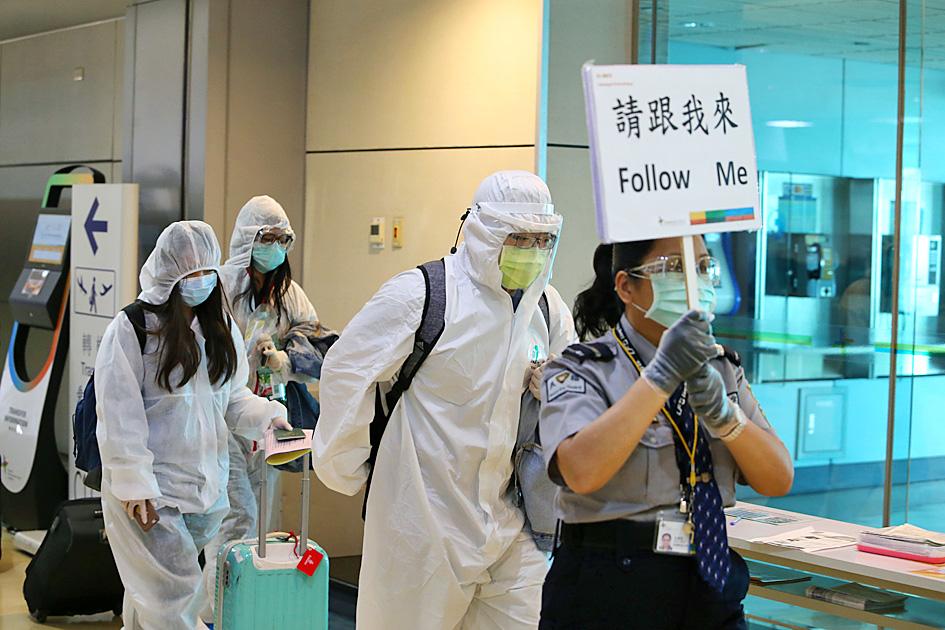A total of 116 Taiwanese yesterday morning arrived home from Warsaw on board a charter flight operated by LOT Polish Airlines, after being stranded in the European country for months due to the COVID-19 pandemic.
It was also the first-ever direct passenger flight between Taiwan and Poland, said the Polish Office in Taipei, the de facto Polish embassy in Taiwan in the absence of diplomatic relations.
The two countries signed an air transport agreement in March 2015.

Photo: Tony Yao, Taipei Times
The airplane landed at Taiwan Taoyuan International Airport at 6:24am after a 13-hour flight.
The plane had to make a three-hour detour, as it was not allowed to fly over China.
The passengers, mostly students and businesspeople, were quarantined upon arrival for 14 days in accordance with the Central Epidemic Command Center’s instructions after undergoing initial health checks.
The charter flight was made possible through the efforts of Lin’s International Consulting Co Ltd, an overseas student service, and coordination between Taiwan’s Civil Aeronautics Administration and LOT.
It took the parties involved three to four weeks to arrange the charter flight, Lin’s International said.
There would be three more such flights to evacuate Taiwanese from Poland in the near term, the company said.
Without the charter flights, the Taiwanese in Poland would have had to travel to Germany by land for more than 10 hours before they could board a flight home, which could increase the risk of infection, it added.
The Taoyuan airport assigned ground personnel and cleaning staff as early as 2am to prepare for the arrival and arranged six buses to take the passengers to designated quarantine centers.

CHAOS: Iranians took to the streets playing celebratory music after reports of Khamenei’s death on Saturday, while mourners also gathered in Tehran yesterday Iranian Supreme Leader Ayatollah Ali Khamenei was killed in a major attack on Iran launched by Israel and the US, throwing the future of the Islamic republic into doubt and raising the risk of regional instability. Iranian state television and the state-run IRNA news agency announced the 86-year-old’s death early yesterday. US President Donald Trump said it gave Iranians their “greatest chance” to “take back” their country. The announcements came after a joint US and Israeli aerial bombardment that targeted Iranian military and governmental sites. Trump said the “heavy and pinpoint bombing” would continue through the week or as long

TRUST: The KMT said it respected the US’ timing and considerations, and hoped it would continue to honor its commitments to helping Taiwan bolster its defenses and deterrence US President Donald Trump is delaying a multibillion-dollar arms sale to Taiwan to ensure his visit to Beijing is successful, a New York Times report said. The weapons sales package has stalled in the US Department of State, the report said, citing US officials it did not identify. The White House has told agencies not to push forward ahead of Trump’s meeting with Chinese President Xi Jinping (習近平), it said. The two last month held a phone call to discuss trade and geopolitical flashpoints ahead of the summit. Xi raised the Taiwan issue and urged the US to handle arms sales to

A magnitude 5.6 earthquake struck off the coast of Yilan County at 12:37pm today, with clear shaking felt across much of northern Taiwan. There were no immediate reports of damage. The epicenter of the quake was 16.9km east-southeast of Yilan County Hall offshore at a depth of 66.8km, Central Weather Administration (CWA) data showed. The maximum intensity registered at a 4 in Yilan County’s Nanao Township (南澳) on Taiwan’s seven-tier scale. Other parts of Yilan, as well as certain areas of Hualien County, Taipei, New Taipei City, Taoyuan, Hsinchu County, Taichung and Miaoli County, recorded intensities of 3. Residents of Yilan County and Taipei received

Taiwan has secured another breakthrough in fruit exports, with jujubes, dragon fruit and lychees approved for shipment to the EU, the Ministry of Agriculture said yesterday. The Animal and Plant Health Inspection Agency on Thursday received formal notification of the approval from the EU, the ministry said, adding that the decision was expected to expand Taiwanese fruit producers’ access to high-end European markets. Taiwan exported 126 tonnes of lychees last year, valued at US$1.48 million, with Japan accounting for 102 tonnes. Other export destinations included New Zealand, Hong Kong, the US and Australia, ministry data showed. Jujube exports totaled 103 tonnes, valued at